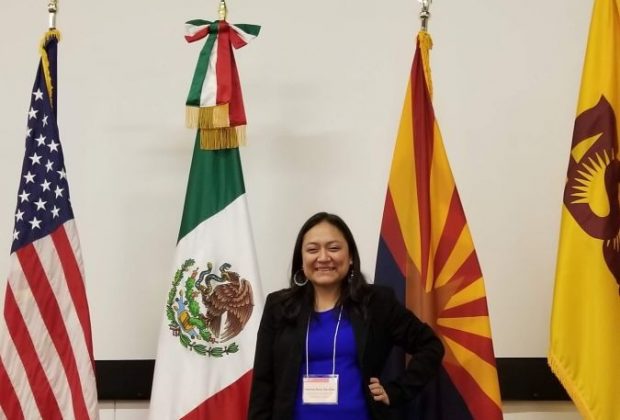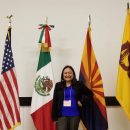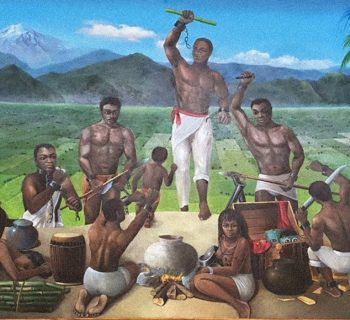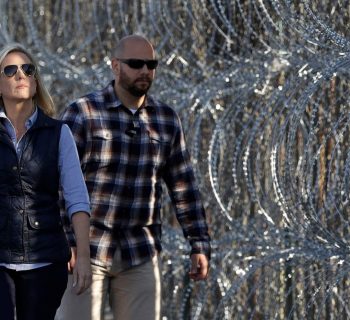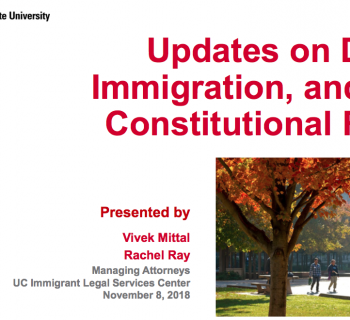She is included in the list of multi-member migrant candidates by the Morena party to go to the Senate
By Araceli Martinez Ortega | La Opinion | Mar. 7, 2024 | Photo Courtesy of Karina Ruiz
Karina Ruiz, a 39-year-old dreamer grandmother, became the first beneficiary of the Deferred Action for Childhood Arrivals (DACA) program to be a candidate for migrant senator in Mexico.
“It is a very great honor and a huge responsibility to bring the voice of the immigrant community to Mexico, specifically that of the Mexicans who live here and there, where there are many transition migrants and we have to see the treatment they are given,” said Karina, executive director of the Arizona Dream Act Coalition Inc in an interview with La Opinión after learning that she is number 12 on the list of senators through the multi-member route (proportional representation) of the ruling Morena party.
This means that she is one step away from being the first Dreamer to be part of the Mexican Senate in the legislature that begins in September.
“I did not seek this candidacy, but the universe and my ancestors have put me on the path to fight for my people, to be that voice that demands change. We are going to have a migrant in the Mexican Senate who has that vivid experience. There are many other stories of migrants that must be brought to see what improvements we can make in the consulates and in the budgets of the Ministry of Foreign Affairs so that they work in communities abroad,” she said.
Daughter of Oaxacan parents, Karina was born in Tlalnepantla in the state of Mexico.
“I arrived in the United States when I was 15, I had celebrated my quinceañera a month ago. “I was about to enter Prepa 3, when the students closed it because they were demanding that tuition not be raised.”
It was her sister who had just come to this country with her son, escaping domestic violence, who asked his father to come to work in Arizona and bring Karina with him, since she was not going to school. due to the closure of classes.
“The plan was to come for a year while we raised money to return to start a business, but when I saw my mother on the plane, telling me that she couldn't let me come to the United States alone, since I was the youngest of the five children , I began to realize that the trip would be longer. We have been in Phoenix, Arizona for 24 years now.”
He says that in 2013, Deferred Action for Childhood Arrivals (DACA) was a glimmer of hope because it allowed him to obtain a work permit and cancel any deportation attempts.
“I was 28 years old in 2013. It took me 9 months for my DACA to arrive. We were on tenterhooks waiting for that relief, which many of us did not believe.”
At that time – she remembers – she was volunteering with lawyers to fill out the DACA, citizenship and renew residency forms.
After having been a parent and youth representative in 2012, and after taking leadership and training courses, in 2015 Karina took over as executive director of the Arizona Dream Act Coalition In c. after graduating from university
”It took me 12 years to graduate in biochemistry, taking one class per semester because of the expensive tuition. I graduated in 2015. It was difficult to take a position because before DACA I had no insurance or experience. "I only got a part-time job so I prioritized fighting to give DACA people a path to citizenship."
Karina comments that she became a grandmother waiting for DACA and immigration reform.
“They have never been able to materialize, the politicians have given us atole with the finger.”
While she acknowledges that DACA gave them a break, it was never designed to be a permanent solution with a path to citizenship. “It is on life support - hanging by a thread.”
Therefore, she says Congress has not taken the initiative to make DACA a law and they have been kept in a state of limbo.
“It has affected our mental health a lot. You have to plan your life every two years. We don't know if we woke up and the Court says there is no more DACA. “We are talking about people who have bought houses - with a life here.”
Don't even think - she says - about the young people who cannot apply because a Texas judge froze that possibility.
“They are at a dead end, and we are in prolonged agony. It is difficult to live in a state of uncertainty and see that the government does not do its job. It has been an uphill struggle. Excuses continue to be made. We are waiting for DACA to go to the Fifth Circuit again, and see what they tell us. The courts don't even agree. “There is a lot of confusion.”
Everything happens for a reason
Karina considers that a dreamer in the Mexican Senate could be a benefit.
“We left Mexico, but Mexico has never left us. In 2017 I was able to return to Mexico with an Advance Parol e permit. Then I returned in 2021, and I have formed my own groups of dreamers to go to Mexico.”
If the Senate seat is confirmed, she will be able to leave for Mexico to fulfill her responsibility as a senator with her Advance Parole permit that authorizes multiple entries into the country for her work.
However, he also has the good news that his 22-year-old son, born in Arizona, will apply for residency.
“ It had taken me a while because I am defending the DACA case of one of the participants in the lawsuit in court in Texas. This Senate candidacy has changed my life 360 degrees; and it is the sign I was waiting for to file the paperwork for residency. My son is the hope of adjusting my status .”
Senator for Affirmative Action
Karina says that as a migrant senator for Affirmative Action she will take migrants into account, listen to them, attend to their needs to see how she can help improve their lives on both sides of the border.
“The Senate of Mexico is an important space to represent a community of young dreamers who are here in this country. I want it to be a spearhead, so that other dreamers see that it is possible to open a door. Our voices are missing both in the United States and in Mexico, and they have to add to the wisdom of the elders.”
She says that part of his current work is to listen, support with procedures, and make the dream of family reunification come true through a visa through the Migrant Dreams groups .
“We have listened to people's needs, their stories and we have done something. You cannot legislate from the offices, you have to go out and listen to the voices of the migrants, those who already have dual nationality, those who returned with their American citizen children, those who are crossing in Mexico.
“Migration is beyond an issue. The best way to serve as a senator is to listen to needs, bringing proposals to make concrete changes; be in communication with those you serve.
“This is a senatorship for the Dreamer community and their families, we must be accountable, meet with the community, maybe it is not so easy to do it in person, but we can do it virtually through what I plan to call Mañaneras Migrantes .”
She believes that her job will not be difficult because she comes from organizing people, and she feels inspired by President Andrés Manuel López Obrador and presidential candidate Claudia Sheinbaum.
Karina has been married for more than 20 years. She is the mother of three children, ages 22, 14 and almost 12; and she is the grandmother of three grandchildren, ages 5, 4 and 3. All males born in Arizona.
“My husband supports me a lot. “His father was an activist with César Chávez.”
He says that his mother is still undocumented in the country, and his father died undocumented due to covid.
The most prominent
Professor Armando Vazquez Ramos, founder of the Study Abroad Program for Dreamers of the California-Mexico Studies Center ( CMSC), which has taken more than 800 Dreamers to Mexico in ten years, to give them the possibility of having legal entry to the United States. United that allows them to obtain residency in the future, he affirms without hesitation that Karina has been the most outstanding of all the dreamers who have traveled to reconnect with their families.
“Karina has applied the concept of this program to help others. “She worked to recover the advanced parole that Trump had canceled, and we achieved it in April 2021 after suing Biden.”
He adds that Karina has already taken 400 dreamers to Mexico in four years, half of what they have achieved in ten years.
“In 2019 she went to lobby in DC, there I saw her as a leader and organizer, and I discovered her great capacity.”

